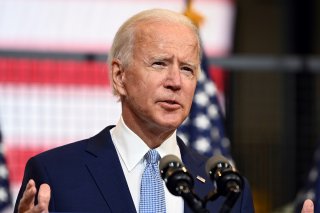Strategic Proactivity: Joe Biden's Possible North Korea Policy
From the author: In short, his diplomacy with North Korea rests on whether the U.S. succeeds, and how quickly, in rebuilding its overall relational power using diplomacy.
Editor’s Note: As Election Day rapidly approaches, and with it, a potential change of presidential administration, the Center for the National Interest’s Korean Studies team decided to ask dozens of the world’s top experts a simple question: If Joe Biden wins come November, what do you expect his North Korea policy to look like? The below piece is an answer to that question. Please click here to see even more perspectives on this important topic.
U.S. presidential candidate Joe Biden’s North Korea policy will not change much in terms of its contents. His administration will require North Korea to disarm substantially before sanctions get partially lifted.
Some people may find disappointing that Joe Biden’s North Korea policy will not be significantly different from the current administration. To be fair, President Donald Trump’s North Korea policy has not diverged significantly from that of his predecessors. All administrations since Bill Clinton did not want to accept a nuclear North Korean state and wanted a complete, verifiable, and irreversible denuclearization (CVID). What is different about Trump’s North Korea policy is that he treated denuclearization talks as an interpersonal interaction instead of state-to-state diplomacy.
The more accurate way, therefore, to pose the question is to ask: how will Biden’s diplomacy with North Korea look?
In short, his diplomacy with North Korea rests on whether the U.S. succeeds, and how quickly, in rebuilding its overall relational power using diplomacy.
What the Trump administration has overlooked is the importance of the U.S.’s relations with not only its Western European friends but also its allies and even its competitor, China. In other words, what has made the U.S. powerful and a hegemon is not only its material capabilities but its relations with both friends and foes. By squandering the benefits derived from America’s relations with many countries, the Trump administration has not only undermined the U.S.’s credibility but also its ability to conduct state-to-state diplomacy. And in crisis diplomacy like that involving North Korea, the inability to coherently conduct state-to-state interactions jeopardizes not only the crisis management process but further erodes mutual trust between America and every other state.
Biden has made clear he will engage with North Korea differently by reversing the Trump administration’s marginalization of diplomacy-decentralizing denuclearization negotiations, strengthening the role of the State Department, working closely with America’s Northeast Asian allies, and, more importantly, he will no longer entertain summits with North Korean leader Kim Jong-un without preconditions.
Except for the preconditioned summit, Biden’s approach to diplomacy seems to resemble that of Barack Obama. However, his administration, if it gets to occupy the White House, should remember that the North Korean nuclear issue has changed significantly since Trump became President. North Korea is not only a de facto nuclear state, but it has also demonstrated great resilience amid years of sanctions. South Korea, even though a strong U.S. ally, has started taking a more proactive, independent policy towards North Korea that may not always align with America’s approach. Its soured relations with Japan also pose a challenge to U.S. multilateralism in North Korea policy. Poor U.S.-China relations have to improve greatly before the U.S. seeks cooperation from China in dealing with North Korea. This means that Biden has a lot more groundwork to do in terms of rebuilding U.S. diplomatic capital before it can focus on North Korea.
Strategic proactivity, instead of strategic patience, will be Biden’s North Korea policy.
Minseon Ku is a PhD candidate in International Relations at The Ohio State University.
Image: Reuters.

